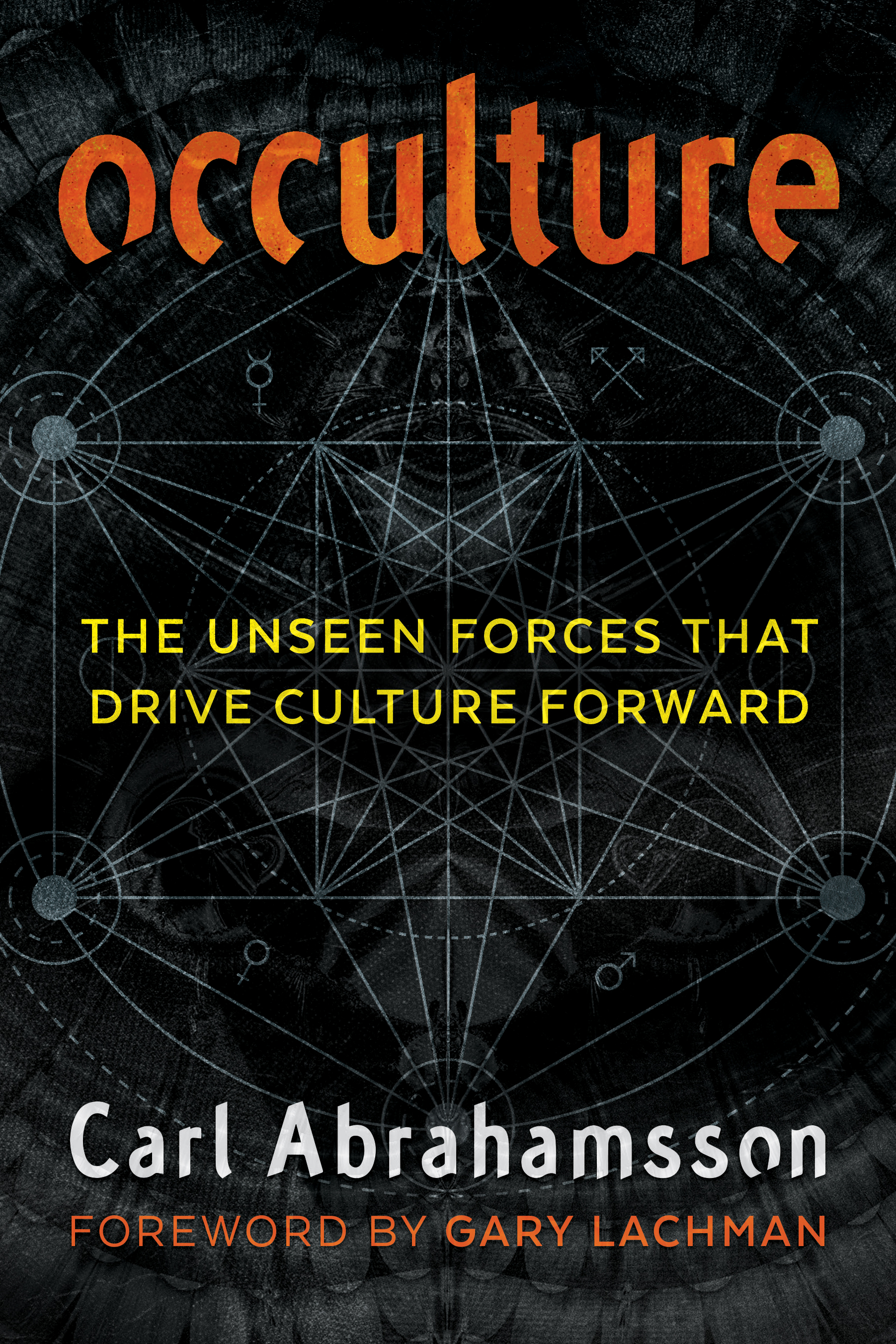The following essay is excerpted from Occulture: The Unseen Forces That Drive Culture Forward by Carl Abrahamsson, foreword by Gary Lachman, published by Inner Traditions. It was originally a lecture delivered at the Psychoanalysis, Art, and the Occult symposium, London, England, 2016.
It seems to me that one is displaying no great trust in science if one cannot rely on it to accept and deal with any occult hypothesis that may turn out to be correct.
Sigmund Freud, “Dreams and the Occult”
In a specifically Western mind frame, we can see many similarities between ritual magic and the psychoanalytic process. A lot of it has to do with formulation, lack of formulation, or, possibly, misapplied or misdirected formulation. We are creators of our own worlds, and they in turn create their own, on their own. Usually, for balanced individuals, the interaction between the formulating strata of the psyche and the formulated expressions is well adjusted. There are also many gray areas in which there is a discrepancy between the two. One such area is lying—or should we say“white lying”?—which could be seen as a minor offense of desired manipulation. Another more pathological area would be a phenomenon like Tourette’s syndrome, in which there is a distinct lack of control of expression of key strata terms.
No matter which perspective we choose to regard this interaction from, there are analogies within the fascinating spheres of occultism and magic. I’d like to narrow that down to a specifically Western mind frame, meaning: fairly rational, decidedly intellectual, and to a great extent ego based. Different systems could be looked at here: Western ceremonial, chaos, witchcraft, and so forth. I’d also like to narrow it down to the individual perspective. What does the individual magician do or express? With this in mind, the equivalent of a white lie could, for instance, be a misdirected expression of will, meaning one that’s not rooted in thought-through, individuated reasoning but something perhaps more immediate, ephemeral, or reactive. And the Tourette’s angle could be the equivalent of magic as a lifestyle attribute rather than an essential, transforming tool that’s perfectly valuable even though it’s not visible and frequent on social media platforms.
Human language is both a blessing and a curse. Nowhere is this so apparent as when one is talking about oneself or expressing what one wants in ritual. Well, it’s apparent in politics too, and in device-instruction manuals. The formulation seems to take place right after the need to express has encountered the comfort-zone filter, and substantial things are usually lost in this translation. It becomes a compromise that makes perfect sense to the ego, a signal filtered out with safe noise.
The destinations in terms of psychoanalysis and magical practice are basically one and the same: in order to change negative behavioral loops and hindrances, we gradually work on small steps and changes, very much through formulation, and hopefully learn more about ourselves while doing that. But in both cases, the road to insight is paved with eloquent defense mechanisms and delusions of grandeur. In both, the underlying problematic emotional or psychic cluster is protected by expressions of what seems to be will. That is, a desired direction. But usually it is not ingrained existential will based on a 100 percent genuine honesty (if there is such a thing) but rather momentary bursts of what appears to be genuine will.
I am not a psychoanalyst but was in Freudian analysis for four and half years, five days a week. So if you’re tired of my voice already now, try to imagine what it was like for me back then! Endless verbiage, swinging from low self-esteem to perfected hubris. But what gradually dawned, as it does, was the insight about the verbal mind’s capacity to cheat in order to be safe, to be escapist in order to stay put, and to be intellectually alluring to stay emotionally remote. This insight was of great help in many ways, not least in the magical work, because I eventually realized that formulation is truly the key to development and success in this field too.
If I say something like, “It is my will to resolve this current problematic issue by changing these related things,” which is what one often does early on in the magical career, as well as in psychoanalysis, this presupposes that I know, first, exactly what the issue consists of, and second, how the interrelated things are actually connected. But is this usually the case? I can answer only for myself and say that initially, I was very quick in both definition and formulation, meaning that I assumed that my formulations were based on insight and genuine will. Thereby I was very intellectual, specific, and causal in my approach. But I’d say that two-thirds of the time, in both ritual work and analysis, what was formulated was mere regurgitation of current affairs, frustrations, and haphazard attempts at solution rather than honest expressions of a deeper will to change myself, which would incorporate various causal changes in daily life. I wanted the world to spin around me, but that can only happen when I’m perfectly still and balanced.
Here is an example from both spheres. In magic, I wanted to boost a creative project to manifestation in a climactic ritual state of mind, and focused on that in a distinct mental-verbal expression, with high causal hopes. In analysis, I wanted to counteract then current topics of low self-esteem in relationships by becoming more extroverted and socially active in a quite forced way.
A wiser approach would have been, in the case of magic, to express this little specific need through a filter of much deeper resonance: “I want this project to be successfully manifested because that would give me a greater visibility in a field in which I honestly feel I belong on emotional levels.” And in the case of analysis a better approach would of course be to not counteract but instead try to constantly get a deeper insight into why the low self-esteem was there in the first place, and resolve the issue. Basically, you can always go deeper and farther and when you do that in an honest way, the perfect solutions for minor issues will become evident.
In the Western sphere of occultism there is a concept called the holy guardian angel. It’s integrated into many systems and often called by different names. This relates to a principle that is either a more elevated level of your own consciousness that guides you, or an external principle that guides you, depending on which cosmology you ascribe to, or subscribe to. Regardless of which main field we look at, it’s an intelligent principle of externalization, not necessarily as a kind of mirror (as in the case of friends in a conversation which can evoke a “third mind” of creative epiphanies) but rather as an ideal that nudges you in intuitive, personal ways. It’s like someone with a bigger picture not only of where you come from and where you are, but also of where you should be going based on who you truly are.
Does that ring a bell? In analysis, this would be the analyst who remains hidden, out of sight, and who, after an initial period of bonding, passive-aggressiveness, and transference, subtly hints or suggests where to go based on the level of sincerity of the horizontally positioned vertical aspirant.
This leads on to the question if it’s at all possible to be alone in the process of self-knowledge? Do we all need a holy guardian angel and/or a therapist? Of course we’re all social animals with needs of different kinds of interaction; but what I mean is if it’s at all possible to develop alone in spiritual, magical, or therapeutic contexts? Very likely it’s not. Even the sternest gnostics and shamans need to contextualize, share information and insights, and compare the personal findings with those of others, to refine a process that is potentially endless.
One area that’s usually at the attractive center of modern magical life, or the appreciation of modern magical life, is that of dreams. Magicians have tended to see dreams as prophetic or as a similar kind of interactive sphere as that of an inner core, as active imagination/daydreaming, as visions during scrying or astral travel, that is, as a considerably more active phase than the standard Freudian approach to dreams as reminders in symbol of unresolved issues. But the emphasis is there in both environments—a validation of a psychic sphere that demands a third of our lives, and which contains valuable information or fodder for development. We usually refer to the dream sphere as a magical one, meaning, I suspect, that it’s devoid of mental, intellectual, and verbal shenanigans. Other, deeper forces are at play.
The complex symbolic language of ritual magic and occultism may be filtered down pictograms from dreams, passed down throughout the millennia. If we accept the interior interpretation of the holy guardian angel concept, including gradual accessibility to Gnostic wisdom, then all of the stuff comes from the psyches of our ancestors. Before the book form, and before formulated written language, it was easier to contain a lot within fewer symbols. Is that, perhaps, when the corruption and self-deceit began, that is, when we left the inherent meaning of pictograms or symbols in favor of abstracted letters? And is that the reason why many of them linger on in specifically magical spheres, that is, as a needed counterforce to the more recent mental particles of formulation?
From an analytic perspective this would make sense too. As we develop as individuals through anal and oral phases and close ties to the mother, formulation is actually what sets us free and makes us able to interact with more people than the mother. Spoken and then written language is what we use to construct identities apart from the merely biological ones. But it’s a two-edged sword. Because if we have the power to define through formulation, we also have to power to cosmetically adjust and redefine ourselves in different contexts, like playing out daddy against mommy to please your immediate ego, or vice versa if that’s what matters just then. The symbols of dreamland here become nonverbal soothsayers and truth sayers, and the pain of confrontation with certain dreams stands in parity with the degree of actual validity.
Freud’s sexualization of human behavior, as compared to the more cosmic interpretation variant of Jung, also finds its expression in traditional ritual magic in the Western sense. We usually see ritualized behavior based in a dramaturgy that mimics male sexual expression: intellectual outset, transcendence into an encompassing energy, increasing frenzy, ecstatic upheaval with exclamation of more or less formulated desire, and a meditative aftermath in which the wand is laid to well-needed rest. Much of traditional ritual contains symbolic recreations of the original creation. Almost like playacting a Genesis or big bang for personal purposes. This can be expressed in inner preparations through invocations or evocations of third-party helpers, or in outer mapping of complex yet conducive symbologies (astrological, elemental, planetary, etc.) where the magician becomes a seed sower for a specific goal.
One problem with this dramaturgy as well as with Western systems and traditions is that they’re all alluring, complicated, challenging, and mentally strenuous—which means “perfect” to the Western psyche. This goes for both ritual magic and psychoanalysis. Where there’s a system that requires method, devotion, knowledge, and a lot of time (and in the case of analysis, a lot of money), you go to master it, with the causal hope of receiving a degree, a funny hat, or a declaration of good mental health at the end of the process tunnel. But still, the system in itself is not the refining or magical matrix. The gradual waking up to self-deceit is.
Freud’s schematic model of the psyche stems from a hierarchical cultural tradition, in which the motivating desires and drives are “sub” conscious and that which guides us is “above” us. This is a prevalent model for most of human life and not even specifically based in a Western sphere. It’s thereby no surprise that causal, hierarchical models appear in ritual magic contexts too. Whether in group settings in elaborate temples or solitary workings in the mind, there is the magician at the top, commanding the sub-forces via the centered consciousness of formulation. Even angelic beings within a romanticized pseudoreligious context are commanded by words of power and elaborate symbolic structures of correspondences in time and space. The more complex it becomes, the more complex it becomes. If the formulation of the will isn’t founded in genuine self-knowledge, things can easily get topsy-turvy. Because a human drive is always stronger than a human intellectual concept or structure. Externalized dualistic concepts with projected or invested moral qualities can absolutely bite back if what you exclaim doesn’t resonate with your own genuine morals.
In a more analytical language, you could say that that striking out in compensation or projection may not resolve the issues at all. It very likely will not. What’s needed is self-reflection and soul stripping in a chamber with different kinds of reflective surfaces; many of them will be symbolic. If you’re diligent and honest, all mirrors will crack and there will be no more self-images to see because you have become the sole soul-seer. That’s also the result of the magical process. You may have wallowed through endless systems and initiations (and related power trips) but when push comes to shove comes to compensatory quaquaversalism comes to final stillness—hopefully!—there is only one unique and noise-free mind that is resonant with all other minds. On that level, a brand new magic is available, with no hocus-pocus needed whatsoever.
My advice both in terms of ritual magic and analysis is to dig deeper before something is eventually expressed in an intellectual decompression chamber that allows for things to manifest. The causal manifestation of something desired is totally fine as the cherry on top, but the cake as such is usually baked with considerably more complex and not seldom painful ingredients. That goes for both these areas. If you strive for the cherry but can’t properly make a great chocolate cake first, you may instead end up with steak-and-kidney pie, and ensuing disappointment.
***












